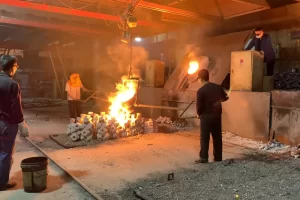Language:
Understanding the Importance of the Initial Sample Inspection Report (ISIR) in Manufacturing
Within the manufacturing sector, a pivotal procedure often demands our attention, particularly within investment casting foundries. The Initial Sample Inspection Report (ISIR) assumes a significant role in guaranteeing the quality and precision of metal parts. Chinese foundries, exemplified by Taiyuan Simis Investment Casting Co., Ltd. This blog delves into the essence of initial sample inspection report, unpacking its importance in manufacturing, where accuracy and quality are top priority.
What is an ISIR?
The Initial Sample Inspection Report, or ISIR, is a document that is integral to the quality assurance process in manufacturing, especially in the production of metal parts. It represents a comprehensive inspection of initial production samples, carried out to ensure that all product specifications and quality standards are met before mass production commences. This report is particularly crucial in precision-driven process such as investment casting, where even minor deviations can have significant implications.
Components: Typically, an ISIR includes detailed measurements of the sample parts, adherence to the specified material properties, and compliance with design tolerances. It also encompasses a thorough assessment against all agreed-upon quality criteria.
Role in Quality Assurance: In the context of a Chinese foundry like Taiyuan Simis Investment Casting Co., Ltd, the ISIR is a cornerstone of their commitment to delivering superior quality metal parts. It serves as a proactive measure to identify and rectify any potential deviations from the desired product specifications.
The ISIR Process
The process of generating an ISIR is methodical and requires meticulous attention to detail.
Creation: Typically, the responsibility of creating an ISIR falls on the shoulders of the supplier, in this case, a manufacturer like Taiyuan Simis Investment Casting Co., Ltd. This is done before the commencement of full-scale production, especially for new products or after any significant changes to the production process or materials.
Inspection Criteria: The ISIR process involves a thorough inspection of various criteria, including dimensional accuracy, material consistency, and overall workmanship of the metal parts. The goal is to ensure that every aspect of the product matches the client’s specifications to the letter.
Approval Process: Once the ISIR is completed, it is usually reviewed and approved by the customer. This step is vital, as it signifies the customer’s confidence in the supplier’s ability to produce the parts as specified. In some cases, it may also need to comply with specific industry standards or regulatory requirements.
Industries and Applications
Key Industries: The initial sample inspection report is particularly crucial in industries where precision and quality are non-negotiable. Investment casting, a field where Chinese foundries like Simis relies on ISIRs. These reports are also indispensable in aerospace, automotive, medical devices, and electronics manufacturing, where even minor defects can have serious consequences.
The Benefits of ISIR
Preventing Defects: The proactive nature of the ISIR helps in identifying potential issues before they escalate into costly defects. This early detection is vital in metal working, where reworking a component can be complex and expensive.
Cost-Efficiency: By identifying defects early in the production process, the ISIR helps in avoiding the high costs associated with rework or scrap. For manufacturers, this translates to more efficient production and cost savings that can be passed on to customers.
Customer Trust: The use of ISIRs significantly enhances customer trust. By demonstrating a commitment to quality and precision, suppliers can establish long-term relationships with clients, particularly in sectors where the quality of metal parts is critical.
Conclusion
The Initial Sample Inspection Report (ISIR) is more than just a procedural document in the manufacturing process; it is a cornerstone of quality assurance, particularly in fields requiring high precision, such as investment casting.
Through this detailed exploration, it becomes evident that their role extends beyond mere compliance. They are instrumental in fostering a culture of quality, efficiency, and customer trust. By ensuring that every product batch meets stringent quality standards, they play a critical role in preventing costly defects, enhancing cost-efficiency, and solidifying customer relationships.






